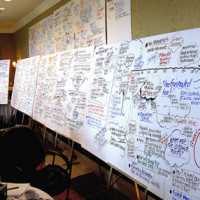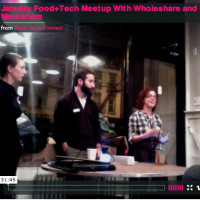Last week I launched a Massive Brainstorm around the question: how can we use social media tools like Twitter, Foursquare, & Facebook to affect the 2012 Farm Bill?
I received the following tweet on Monday from Jason Boucher, an information technologist, writer in higher education, and independent artist manager from New Hampshire.
I followed the link to find Jason’s recent post SOCIAL MEDIA: RURAL EDITION, which focuses on how social media use is growing on farms. Jason is a great example of the diverse range of individuals thinking and writing about how social media is being used to foster communication between farmers and consumers.
When I asked what inspired him to write about the use of social media in rural communities, Jason shared:
“I grew up about an hour north of Boston in Portsmouth, New Hampshire and believe it or not we had many farms around us – I often wondered how they got their food to market. Also, my grandfather grew up in rural Maine as a potato farmer and I’ve always been fascinated with how food is mass from the tiny seeds to a diner’s dinner plate! I’m also President of Social Media Club New Hampshire and one of our missions is to promote social media through education.”
I am thrilled that he agreed to let me share his post with the food+tech community. The original can be found here. Please feel free to contact me at danielle [at] foodtechconnect [dot] com if you have something you would like to share as well.
Social Media: Rural Edition
Rural communities in the United States have notoriously lacked Broadband infrastructure. Places like Clarksville, New Hampshire; Sherman Mills, Maine; and Enosburgh, Vermont, may be behind in the Information Age, but this does not necessarily mean all are purposefully living “off-the-grid.”
Social Media and smartphones are just two examples of how new technology is being embraced by rural areas to broaden communication. Farmers now use smartphones to check the weather forecast, send photos, check the market, or socially connect their farms to the eaters of America, and some even use Twitter to communicate and market their “brand.”
Even Corporate America is joining the cause, as evidenced by Frito-Lay’s recent use of social media to strut the power of the company’s potato farmers and provide them with greenhouses. A big tip of the cowboy hat to this big brand for raising awareness of social media within the farming community by bringing farmers, consumers and social media together.
The tech-savvy generation is an important factor and can help by mobilizing and donating its collective digital talents to create so-called cooperative websites with built-in social networking tools. For example, Becky McCray, located in Oklahoma, helps share the wonders of social media with farm communities, small businesses and rural causes throughout the country and entire world.
The importance of social media needs to continue to be promoted, especially in rural America, on farms, in community centers, shelters, soup kitchens and food banks. Doing so enables each cause to reach hundreds of thousands of people instantly, opens communication and helps spread a message, whether that message is that of a large corporation or an underrepresented community.
Get involved! Make Social Media happen! Is there a rural area that you recently visited or read about that could benefit from social media? How about a charity right in your ‘hood? Think about it, each of us has the power to help. That’s why this works in the first place, right?
Social Media is the fastest way to market your brand or cause. The purpose of Social Media is to share information, build relationships, expand your brand’s reach, and meet potential clients or customers. These digital neighborhoods make our tangible world feel incredibly small, but having a smart, creative online social media presence will connect you to the right audience. All you need is a strategy.
Social media brings a new sense of community, collaboration, & marketing to the web and mobile phones. There are thousands of Social Networking applications, but only a handful are popular, even less are user-friendly, secure, & comprehensible. Join the conversation or visit socialmediaclubnh.org to get involved.
Jason Boucher is an Information Technologist at The University of New Hampshire by day and writer for Bouchermedia by night. He has 10+ years experience working with non-profit college & community radio and is involved with the local art and music community. Jason also hosts social networking meet-ups and is a member of Social Media Club New Hampshire.







